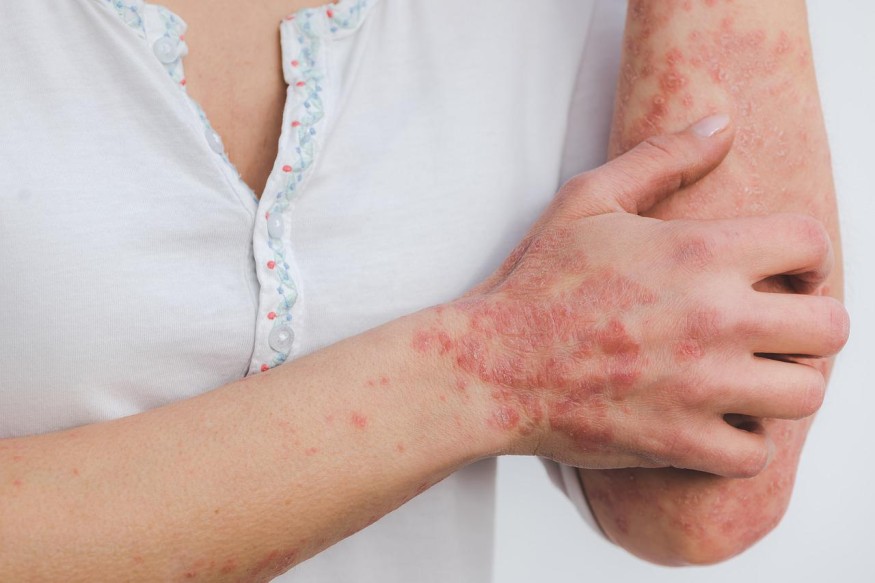Body aches, stiffness, and fatigue are just some of the signs of psoriatic arthritis as it comes with an array of symptoms that can affect the daily life of those who live with it.
This condition is a type of inflammatory arthritis that affects some people who also have a skin condition called psoriasis, characterized by red, and scaly patches on the skin. These two conditions are linked together and here's what should people know about them.

What is Psoriasis?
Psoriasis is a skin condition that causes an itchy, and scaly patches on the skin, especially on the knees, elbows, trunk, and scalp, according to Mayo Clinic. Unfortunately, it is a chronic disease with no cure available until today.
The condition can be painful and disrupt sleep and disturb concentration. More so, psoriasis tends to go through cycles from flaring that could last for months to subsiding for a while. Those with a genetic predisposition for psoriasis are triggered by infections, cuts or burns, and some medications.
It is a chronic disease with no cure available until today, although symptoms are manageable. Lifestyle habits and coping strategies are at the top of the list to help people with skin conditions live better life.
ALSO READ : Kim Kardashian opens up about her psoriasis
While psoriasis is highly visible, an article in WebMD says that it is not contagious like persistent skin conditions, such as herpes or impetigo. Psoriasis is a genetic condition that means it cannot be transmitted to any other person by merely touching them or having close contact with them.
It has been the misconception of many that psoriasis is similar to leprosy in which those who had it were isolated from the community. The National Psoriasis Foundation (NPF) convened 10 years ago to encourage patient advocates to have photos shaking hands with members of Congress to demonstrate that it is not a contagious disease. It was a similar campaign that Princess Diana conducted for AIDS patients.
What is Psoriatic Arthritis; Is It Different From Osteoarthritis?
Psoriatic arthritis is a chronic inflammatory heterogeneous arthritis that is associated with psoriasis because it mainly affects people with psoriasis, according to Mayo Clinic. It is characterized by joint pain, stiffness, and swelling.
It can be visible in any part of the body, particularly the fingertips and spine, ranging from mild to severe. Like psoriasis, psoriatic arthritis may also flare up at times and has periods of remission. There is no cure for this condition, and treatment aims to manage symptoms and prevent joint damage.
Unfortunately, psoriatic arthritis can cause permanent or disabling damage. Former NSync member Lance Bass is reportedly suffering from this condition for five years now, likely due to dancing. However, with a healthy diet and exercise, he was able to manage his symptoms.
Here are some symptoms of psoriatic arthritis, according to WebMD.
- Swollen joints, fingers and toes
- Stiff joints
- Back and shoulder pain
- Enthesitis
- Nail pitting
- Chest and rib pain
- Fatigue
Psoriatic arthritis has the same symptoms as osteoarthritis and rheumatoid arthritis. But while psoriatic symptoms flare and subside, the pain and swelling one experiences with osteoarthritis tend to get worse over time, according to Everyday.
The Link Between Psoriatic Arthritis and Psoriasis
In another article, WebMD explains that not all psoriasis patients will get psoriatic arthritis even if the two conditions are often related. Whereas psoriasis causes red, scaly patches on the skin, psoriatic arthritis causes joint swelling and stifling that is painful and may lead to permanent damage.
Inflammation is part of both conditions as the immune system attacks its own body instead of foreign bodies. Less than one-third of those with psoriasis will get psoriatic arthritis and doctors have no way yet to tell who is going to have them.
Usually, psoriasis comes first before psoriatic arthritis appears after a few months or years. That makes it harder for doctors to diagnose. But people with severe psoriasis often have the greatest risk of getting psoriatic arthritis.
Like psoriasis, psoriatic arthritis is also a genetic condition in which 40% of people with the condition have relatives suffering from it or psoriasis. As of now, scientists do not know which genes are responsible for these conditions, but figuring it out may lead to new treatments.
RELATED ARTICLE : Handheld Scanner Device Successfully Unveils Important Psoriasis Data Without Radiation Exposure
Check out more news and information on Psoriasis in Science Times.












